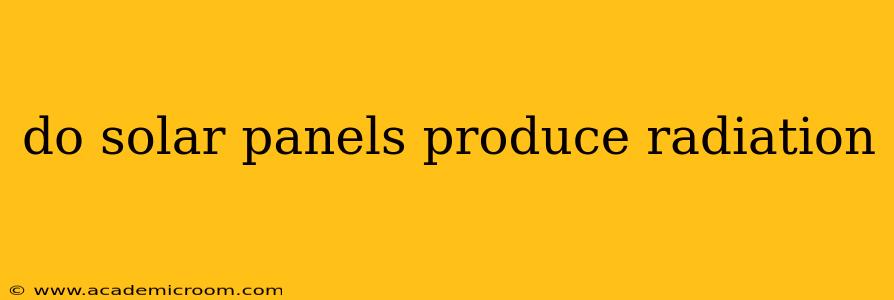Do Solar Panels Produce Radiation? Understanding the Facts
The question of whether solar panels produce radiation is a common one, fueled by understandable concerns about the potential health impacts of this increasingly popular technology. The short answer is: no, solar panels do not produce ionizing radiation, the type of radiation that can damage DNA and cause health problems. However, they do produce a different type of radiation, and understanding the nuances is key to dispelling any misconceptions.
Let's delve deeper into the different types of radiation and how they relate to solar panels.
What Types of Radiation Do Solar Panels Produce?
Solar panels primarily interact with two types of radiation:
-
Sunlight (Electromagnetic Radiation): This is the fundamental energy source for solar panels. Sunlight consists of various forms of electromagnetic radiation, including visible light, infrared radiation (heat), and ultraviolet (UV) radiation. Solar panels absorb this radiation, converting it into direct current (DC) electricity. While UV radiation in sunlight can be harmful in excessive amounts, the solar panel itself doesn't generate it – it simply intercepts and utilizes it. The amount of UV radiation reaching your skin is significantly reduced by the panels' presence.
-
Non-Ionizing Electromagnetic Radiation: The electricity generated by solar panels is a form of non-ionizing electromagnetic radiation. This type of radiation has much lower energy than ionizing radiation and is not considered harmful at the levels produced by solar panels. Examples of non-ionizing radiation include radio waves, microwaves, and visible light – things we encounter daily without adverse effects. The electromagnetic field (EMF) produced by solar panels is similar in strength to household appliances like refrigerators or hair dryers.
Are Solar Panels Safe? Addressing Common Concerns
While solar panels don't produce ionizing radiation, some concerns remain:
H2: Do solar panels emit harmful electromagnetic fields (EMFs)?
Extensive research worldwide has shown that the EMFs generated by solar panels are well below levels considered harmful by major health organizations like the World Health Organization (WHO). These fields are significantly weaker than those emitted by common household appliances. There's no credible scientific evidence linking the EMFs from solar panels to any health problems. However, individual sensitivities exist, and if you have concerns, it's always best to consult with a healthcare professional.
H2: Do solar panels produce any other type of radiation?
No, beyond the sunlight they intercept and the low-level EMFs generated by the electricity they produce, solar panels don't generate other forms of radiation. They don't emit X-rays, gamma rays, or other types of ionizing radiation that pose a health risk.
H2: What about the materials used in solar panels?
Solar panels contain materials like silicon, glass, and aluminum. While some of these materials could pose environmental risks if improperly handled or disposed of, they do not emit radiation in their typical use within a solar panel.
H2: Are there any long-term health effects associated with solar panels?
Current scientific evidence strongly suggests there are no long-term health effects associated with living near or using solar panels. The levels of radiation emitted are too low to cause harm. However, ongoing research continues to monitor the potential impacts of long-term exposure to low-level EMFs.
Conclusion:
In summary, solar panels do not produce ionizing radiation and pose no known significant health risk due to radiation. The low-level EMFs they generate are comparable to those produced by everyday appliances. While concerns about EMFs are understandable, extensive research reassures us of their safety. If you have specific concerns, consult a medical professional or refer to research published by reputable organizations like the WHO.
